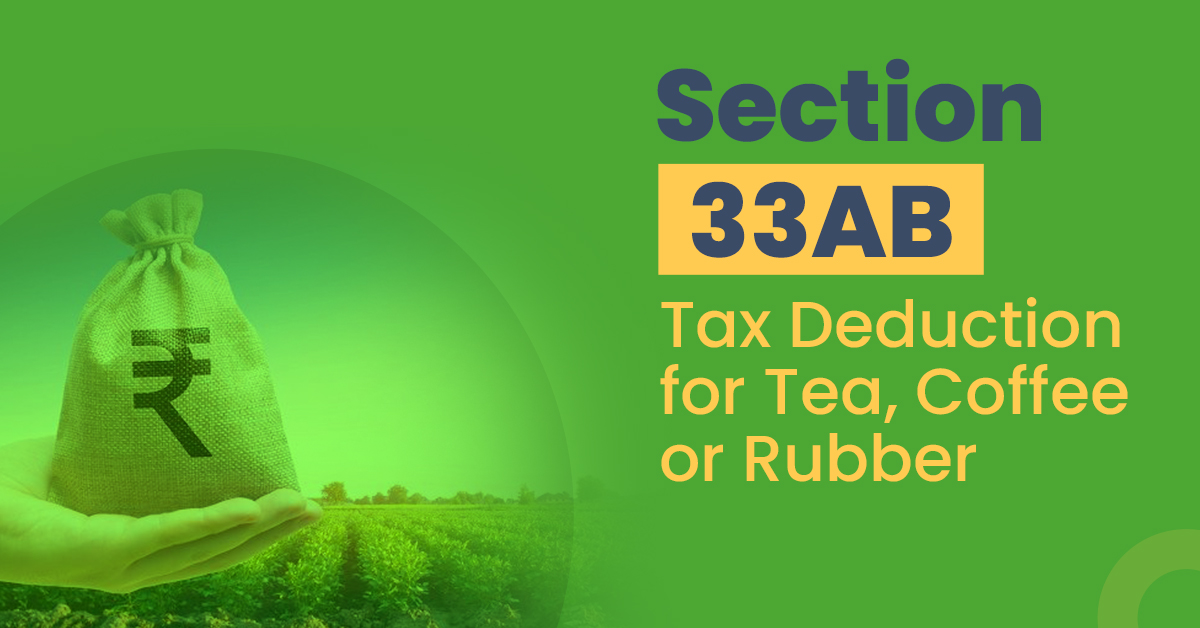Section 33AB: Tax Deduction for Tea, Coffee, Or Rubber


Tax compliance demands a thorough knowledge of tax laws. If you are running a business, you must be aware of all applicable laws to stay tax compliant and avoid penalties. Knowing the provisions of various sections of the Income Tax Act of 1961 can help reduce your tax outgo.
If you are in the business of cultivating or manufacturing tea, coffee, or rubber, know more about the provisions available under Section 33AB of the Income Tax Act, 1961.
Let us understand the implications of Section 33AB of the Income Tax Act, 1961, in detail!
What is Section 33AB of the Income Tax Act 1961?
As per Section 33AB of the Income Tax Act, 1961, if you are running a business that deals with the manufacturing or cultivation of tea, coffee, or rubber, you are eligible for tax deduction, provided you deposit a certain amount in the specified account as mentioned under section 33AB.
Where to deposit?
You are required to deposit the requisite amount (for utilising it for the specified purposes) in either of the following accounts to claim the deduction:
- Deposit the requisite amount per the Tea Board, Coffee Board, or Rubber Board scheme in a ‘special account’ with the NABARD (National Bank for Agriculture and Rural Development).
- Deposit the requisite amount per the Tea Board, Coffee Board, or Rubber Board scheme in any ‘deposit account.’ However, the scheme should be approved by the Central Government.
Amount of deduction:
The following amount of deduction is available under Section 33AB of the Income Tax Act, 1961:
- The sum equal to the amount deposited or the aggregate of the amount deposited,
OR - The sum equal to 40% of the profit from such business (computed under the head PGBP, Before making the deduction under this section).
Whichever is less among the above two amounts is allowed for deduction under Section 33AB of the IT Act.
Let us understand this with an example. Let us say you deposited ₹ 1,20,000 in the ‘special account’ you maintain with NABARD (National Bank for Agriculture and Rural Development). Assuming the profit from your coffee manufacturing business for the year is ₹2,00,000, then:
| Particulars | Amount |
| The amount deposited in the NABARD account | ₹ 1,20,000 |
| 40% of the profit from the business | ₹ 80,000 (40% of ₹2,00,000) |
| Amount of deduction allowed under Section 33AB | ₹ 80,000 |
Time period to deposit the amount
The following is the period by which you need to deposit the amount in the ‘special account’ or the ‘deposit account’ to claim the deduction.
- Before the completion of six months from the end of the preceding year / Six months from the end of the financial year in which you claim the deduction.
or - The due date for filing Income Tax Return (ITR).
Whichever is earlier should be taken as the period to deposit the amount.
Let us understand this with a few scenarios. If you are claiming the deduction in the 2023–24 fiscal year,
Scenario 1 Applicable to
You need to deposit the amount by the period that is earlier among the two:
- Before the completion of six months from the end of the preceding year: 30th September 2023
- The due date for filing Income Tax Return (ITR): 31st July 2023.
The earlier of the two is 31st July 2023. Hence, you must deposit the amount in the ‘special account’ or the ‘deposit account’ by 31st July 2023.
This scenario is applicable to the assessee other than the assessee covered in Scenario 2 & 3
Scenario 2
You need to deposit the amount by the period that is earlier among the two:
- Before the completion of six months from the end of the preceding year: 30th September 2023
- The due date for filing Income Tax Return (ITR): 31th October 2023.
Hence, you must deposit the amount in the ‘special account’ or the ‘deposit account’ by 30th September 2023.
This scenario is applicable to following assessee
- Company
- Every person other than company whose books of account are required to be audited under Income tax Act or any other law
Scenario 3
You need to deposit the amount by the period that is earlier among the two:
- Before the completion of six months from the end of the preceding year: 30th September 2023
- The due date for filing Income Tax Return (ITR): 30th November 2023.
The earlier of the two is 30th September 2023. Hence, you must deposit the amount in the ‘special account’ or the ‘deposit account’ by 30th September 2023.
This scenario is applicable to following assessee
- Assessee who is required to filed the report u/s 92E for
Deduction u/s 33AB shall not be allowed unless the books of accounts of the assessee is audited by a chartered accountant before the due date of audit.
Withdrawal of the deposited amount
The amount deposited in the ‘special account’ or the ‘deposit account’ can be withdrawn under the following conditions:
- For the specific purposes as per the scheme of the Tea Board, Coffee Board, or Rubber Board
- On the death of the assessee
- On the closure of business
- On the partition of the Hindu Undivided Family
- On liquidation of the company or dissolution of the firm.
The taxability of the amount withdrawn for each of the above purposes is different. Let us understand the taxability of the withdrawn amount for the above cases. The following is the taxability for the withdrawn amount.
| Purpose of withdrawal | Taxability |
| Dissolution of firm | Taxable |
| Closure of business | Taxable |
| Death of the assessee | Non-taxable |
| Partition of Hindu undivided family (HUF) | Non-taxable |
| Liquidation of the company | Non-taxable |
However, there are some important points to keep in mind to avoid the withdrawal of deduction allowed under Section 33AB of the Income Tax Act, 1961.
- Treated as income: When you withdraw the amount deposited and you do not utilise it for a specified purpose, the withdrawn amount is treated as ‘income’ while computing income under the head ‘Profits and gains of business or profession’ and charged to income tax.
- Assets purchased from the deposited amount: You cannot sell/transfer such assets up to eight years from the end of the financial year in which an asset is then purchased; otherwise, the deduction allowed is withdrawn, and the purchase value is treated as ‘income’ and charged to income tax.
Any gains from the asset’s sale are treated as a ‘short-term capital gain’ for tax purposes. However, the assets sold to the Government, the Government company, or the local authority, along with the firm’s conversion to the company (wherein all assets and liabilities are transferred to the company and the proprietors become shareholders), are considered to be an exception.
Let us understand this with an example: You purchase an asset worth ₹1,00,000 as per the scheme in 2020 and sell it for ₹1,30,000 in 2022. Since you have sold the asset within eight years of purchase, the ₹1,00,000 from the sales proceeds is treated as ‘income’ and is charged to income tax. A gain of ₹ 30,000 from the sale asset is treated as a ‘short-term capital gain’.
Conditions to utilise the deposited amount
The amount deposited in the ‘special account’ or the ‘deposit account’ can be utilised as per the scheme of the Tea Board, Coffee Board, or Rubber Board. However, the amount deposited cannot be used for the following purposes to claim the deduction under Section 33AB of the Income Tax Act, 1961.
- Purchase of plant and machinery for residential purposes and office purposes
- Purchase of assets for which a 100% deduction is allowed under PGBP (Profits and gains of business or profession (100% depreciable assets))
- Purchase of office appliances, excluding computers
- Purchase of plant and machinery for the production or construction of anything or article listed in the Eleventh Schedule
The deposit amount utilised for these purposes is treated as ‘income’ while computing income under the head ‘Profits and gains of business or profession’ and charged to income tax.
Important points to note
The following are some of the critical points to note while claiming a deduction under Section 33AB of the Income Tax Act, 1961:
- You can avail of the deduction under Section 33AB of the Income Tax Act, 1961, only if a Chartered Accountant audits your books within a specified date. You need to obtain the audit report from the Chartered Accountant in a prescribed form (Form 3AC)
- If the books are already audited under any law, there is no need for a separate audit for Section 33AB of the Income Tax Act, 1961. However, ensure that you furnish the audit report from the Chartered Accountant in Form 3C.
- The amount deposited in the specified ‘special account’ or the ‘deposit account’ must be used per the scheme of the Tea Board, Coffee Board, or Rubber Board. However, the utilised amount from the specified ‘special account’ or the ‘deposit account’ is not considered an expenditure while computing the profit from your business under the head ‘Profits and gains of business or profession.’
To stay tax compliant and to claim the benefits available for you under various provisions of the Income Tax Act, it is important to understand the Sections relevant to your business in detail.
Frequently Asked Questions (FAQs):
If I utilised the amount deposited in the NABARD account for purchasing CCTV cameras and fire extinguishers for the guest house, can that be considered for deduction benefit?
No. As per the provisions of Section 33AB of the Income Tax Act, 1961, deposit amounts utilised for purposes that are not allowed or for purchasing ineligible assets as per the scheme of Tea, Coffee, or Rubber Board are treated as ‘income’ and are charged to income tax.
The list of ineligible assets includes plants or machinery purchased for the guest house. Hence, the amount utilised to buy CCTV cameras and fire extinguishers for the guest house is not considered for deduction benefit under Section 33AB.
Do rules governing the tea, coffee, and rubber industry keep changing?
Rules can be subject to change when the Government deems it necessary to alter or modify or make new rules for governing these industries or if it is of the view that the current legislations are redundant and therefore, require new legislation to promote the economic growth of the industry/sector.
Which form should I use to avail the deduction benefit under Section 33AB of the Income Tax Act, 1961?
You need to use Form No. 3AC, an audit report under Section 33AB (2) of the Income Tax Act, 1961, to claim the deduction benefits.
Suppose I utilise part of the withdrawn amount from the NABARD account to purchase eligible and ineligible assets per the scheme. Can I claim a deduction for the total amount?
You can claim a deduction only for the withdrawn amount utilised for purchasing an eligible asset. For example, you withdraw ₹5,00,000 from your NABARD account.
You utilise ₹3,00,000 to purchase an eligible asset per the scheme and spend ₹2,00,000 to purchase ineligible assets. In this case, only ₹3,00,000 is considered for deduction under Section 33AB of the Income tax Act






